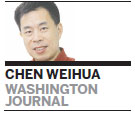

It is more than double happiness for the giant pandas and their fans at the Smithsonian's National Zoo this weekend.
On Saturday, giant panda Mei Xiang gave birth to twin pandas. On Sunday, Mei Xiang's daughter Bao Bao celebrated her second birthday in the yard surrounded by a large crowd.
The enthusiastic crowd of all ages sang birthday songs as Bao Bao slowly came to the big birthday cake, known as fruitsicle. She fondled and sucked the cake before finally cracking a piece to enjoy.

A woman in a wheelchair tried to find a spot to observe the birthday party. From Hawaii and visiting the national zoo for the first time, she said she came with her friend who told her about the birthday and the newborn twins.
"It's wonderful," said the woman, who identified herself as Hermine.
Jeff Schneider, from Maryland, came with his wife and 4-year-old son Bryce. As members of the zoo, Schneider said they try to come as often as they can.
Bao Bao was born on Aug 23, 2013. At her 100-day naming ceremony, the two first ladies of China and the United States, Peng Liyuan and Michelle Obama, sent their congratulation in videotaped speeches.
Before Bao Bao's birthday party, the zoo held a press conference in the early morning, confirming that on Saturday, a giant panda cub was born at 5:35 pm and a second one born at 10:07 pm.
Dennis Kelly, director of the Smithsonian’s National Zoo, said "we are surprised but prepared, because we know 50 percent of the times we expect twins".
"This is a very exciting time and very risky time," he said, referring to the excitement around the panda house and also the stress of raising two very tiny animals. But he said the team at the zoo has learned over the years, and that may contribute to the higher fertility of Mei Xiang.
Shortly after the second birth, a panda team of three keepers was able to retrieve one of the cubs and placed it in an incubator.
Don Neiffer, chief veterinarian of the zoo, said that the cub they retried on Saturday was the second cub born at 10:07. He described the cub as vocalizing very well and appearing healthy.
The second cub weighed 138 grams Saturday night and 132.4 grams Sunday morning.
The panda team was able to swap cubs on Sunday morning around 6:30 am. The cub they had in the incubator Sunday morning is believed to be the first born. It weighed 86.3 grams. The zoo also described it as "vocalizing very well and appears strong".
Neiffer is not sure whether Mei Xiang will allow the panda team to consistently swap the cubs.
The panda team said it has developed a few different strategies, and will continue to try different methods of swapping and hand-rearing. Much of their methods will be dictated by Mei Xiang.
The panda team will alternately swap the cubs, allowing one to nurse and spend time with Mei Xiang while the other is being bottle-fed and kept warm in an incubator. The primary goal for the panda team is for both cubs to have the benefit of nursing and spending time with their mother. It is too early to guess about when the cubs will be placed together.
Reproductive scientists from the zoo and Conservation Biology Institute artificially inseminated Mei Xiang on April 26 and 27. For the first time, scientists used semen collected from a giant panda named Hui Hui, who lives at the China Conservation and Research Center for the Giant Panda in Wolong and was determined to be one of the best genetic matches for Mei Xiang. A cub by Mei Xiang and Hui Hui would be genetically valuable, helping to preserve the genetic diversity of the panda population in human care, according to the zoo.
Scientists also used high-quality fresh semen collected from the zoo's male giant panda, Tian Tian, for the artificial insemination. DNA analysis will be used to determine the sire of the cub.
Copper Aitken Palmeer, chief veterinarian at Smithsonian Conservation Biology Institute, said on Sunday that the zoo's team has worked closely with their Chinese colleagues in the giant panda-breeding base in China.
"Clearly the Chinese are the experts. They have far more giant pandas. We have been talking throughout the night with our Chinese colleagues. We talk to them constantly," she said.
"Their scientists come here and we go there. For example, I go to Wolong three times a year, and I spend much time during breeding season in China," she said.
Laure Thompson, giant-panda biologist at the zoo, said she was in China in March and that several of her colleagues were there to learn how to raise cubs and learn the feeding process. "We do work very closely with China," she said.
Besides Bao Bao, Mei Xiang has gave birth to another surviving cub. Tai Shan. on July 9, 2005. Taishan now lives in China. Both were born through artificial insemination.
Contact the writer at [email protected]